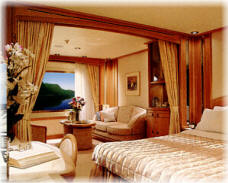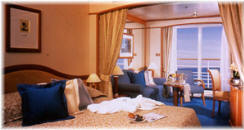|
Back in the 1920s and 1930s, companies such as
Canadian Pacific and the French Line began experimenting with a change in class
from the old First, Second and Tourist Third classes to come up with some rather
novel attempts at reclassifying ships.
Indeed, the French Line had introduced a single
class ship as far back as 1907 with the Chicago. In 1922, the North Atlantic
lines lowered First Class fares, especially on older ships, but held Second and
Third Class fares, and some of the older ships carrying three classes were
change into "one cabin" ships. Canadian Pacific then built quite a number of
Cabin Class liners that charged less than First Class fares. The advantage of
these one-class or Cabin ships was that passengers had run of the ship now that
they were no longer segregated into three classes.
Later, in February 1936, the North Atlantic Passenger Conference, the body that
then set fares, came up with three "new" classes - Cabin Class, Second Class and
Tourist Class and ships such as the Normandie and Queen Mary when first
introduced had no First Class, which would make a comeback however after the
Second World War. Only the Italian ships such as Rex and Conte di Savoia
maintained First Class as they were not members of the Conference.
Cruising in turn saw the rise of single-class run of the ship vessels. For a
while, some British ships charged First and Tourist Class cruise fares, but this
practice soon fell out of use on cruises and passengers were given a more
democratic run of the ship, the earlier segregation having served to separate
First Class businessmen and millionaires from the destitute masses emigrating to
America.
In recent years we have been seeing similar innovations being made by cruise
lines. Celebrity Cruises introduced their Concierge Class in the about 2003,
which meant priority check-in, a chilled bottle of sparkling wine in the room on
arrival, fresh flowers daily, fresh fruit, complimentary binoculars, bathrobes,
afternoon canapés and sundry other minor amenities. Every Celebrity ship now
offers Concierge Class cabins.
In 2008, MSC Cruises introduced something called "Yacht Club" on its MSC
Fantasia class vessels, with 99 suites in an exclusive VIP area at the top of
the ship with its own private Top Sail Lounge with a forward view that is denied
to all other passengers. Yacht Club passengers also have priority embarkation,
private butler and concierge service, two whirlpools and a private swimming
pool. One passenger was even quoted by "Cruise Critic" as saying "This
experience on board is better than on Silversea."
Last month, from the same shipyard, came Norwegian Epic, delivered with a huge
private area on top of the ship that contains its own "ship within a ship"
feature that frankly ruins the appearance of the ship as it sits right forward
above the bridge like a massive carbuncle. That carbuncle contains sixty massive
suites centred around a two-deck-high private courtyard.
Forty-six Courtyard Villas, each with two bedrooms and two bathrooms, measure
more than 500 square feet; six Courtyard Penthouses with a bedroom and a
separate living and dining area, at more than 320 square feet, and top of the
pile, eight deluxe Owners Suites, at more than 850 square feet, with
floor-to-ceiling windows and separate bedroom, living and dining areas.
Similar to what happens in MSC's Yacht Club, guests staying in these suites on
Norwegian Epic will have exclusive access to a Courtyard Villa complex that
includes a pool, two whirlpools, gym, saunas, sun deck, indoor/outdoor dining, a
bar and nightclub and concierge lounge.
NCL had started this trend on their own with its Garden Villas on their earlier
"Jewel" class Freestyle ships five years ago, but now seem to have taken
advantage of STX's experience with the new MSC ships as well. The biggest
disadvantage with both the MSC ships and NCL's is that the suites with
floor-to-ceiling windows up forward face into the wind and therefore do not have
balconies, a major detraction for the terrific forward views.
And of course, the longest-standing purveyor of class is Cunard Line, which has
for decades now operated its so-called Grill Class accommodation on first the
Queen Elizabeth 2, with three grills (Queens, Princess and Britannia) and then
the Queen Mary 2 with two grills (Queens and Princess).
Passengers occupying the best suites and accommodation on board of course dine
in the grills, with Princess Grill passengers coming from the smaller suites
(335 to 380 square feet) and Queens Grill passengers from the larger ones (500
to 2,250 square feet) and also benefit from the Queens Grill Lounge.
Subsequently, Cunard Line introduced yet another class of accommodation when it
introduced the Club Britannia concept a few years later, whereby passengers
accommodated in the best veranda cabins on Deck 12 have been allocated a
separate area of the three-deck high main Britannia Restaurant for open sitting
dining. These passengers also receive an invitation to the captain's Grill
reception during the voyage, thus introducing them to the higher class diners as
well.
With its newest ships, the Queen Victoria of 2007 and this year's new Queen
Elizabeth, Cunard has kept this tradition, with each having her own Queens and
Princess Grills, with even better views than on Queen Mary 2, on either side of
the funnel casing. Both ships also have an adjacent Courtyard area that is
reserved for Grill Class customers. All Grill Class passengers also enjoy
priority embarkation. strawberries and wine or champagne, terry robes,
personalised stationery and the usual pillow menu!
Each line has its own attractions, and in a lesser way, butlers on Holland
America and priority embarkation on Carnival and Oceania are art of this trend
as well. So are the privileges of many of the cruise lines' loyalty clubs.
But some of the main market lines are trying
even harder now to compete with upmarket lines such as Crystal, Regent, Seabourn
and Silversea and no doubt will be successful in their own way with these new
classes of accommodation. As the years go by, though, more people are being
denied access to certain areas unless they have paid, something that may offend
some passengers as it harks back to an earlier era. |
|
 |







